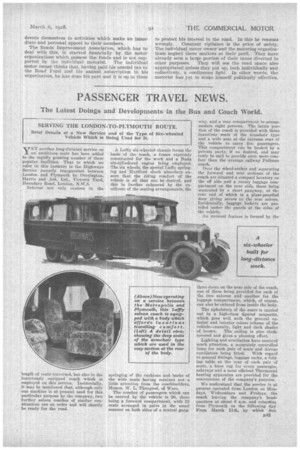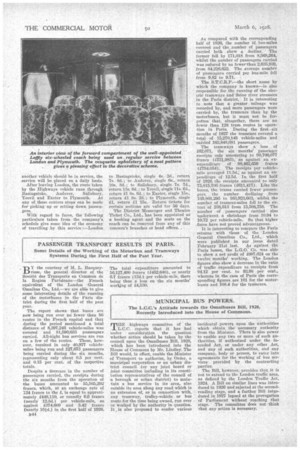SERVING THE LONDON-TO-PLYMOUTH ROUTE.
Page 69

Page 70

If you've noticed an error in this article please click here to report it so we can fix it.
Brief Details of a New Service and of the Type of Six-wheeled Vehicle Which Is Being Used for It.
YET another long-distance service on an ambitious scale has been added to the rapidly growing number of these popular facilities. That to which we refer in this iustanoe is the Highways Service recently inaugurated between London and Plymouth by Overington, Harris and Ash, Ltd., Victoria Yard, Bonnclarz,Road, London, N.W.8.
Interest not only centres in the
length of route traversed, but also in the luxuriously . equipped coach which is employed on this service. Incidentally, it may be mentioned that, although only one machine is at present used for this particular purpose by the company, two further saloon coaches of similar construction are on order and will shortly be ready for the road. A Latlly six-wheeled chassis forms the basis of the coach, a frame expressly constructed for the work and a Buda six-cylindered engine being employed. The six wheels, the special Laffly springing and Hartford shock absorbers ensure that the riding comfort of the vehicle is all that can be desired, and this is further enhanced by the excellence of the seating arrangements, the
springing of the cushions and hacks of the wide seats having received not a little attention from the coachhuilders, Messrs. W. L. Thurgood, of Ware.
The number of passengers which can be carried by the vehicle is 20, there being a forward compartment, with 12 seats arranged in pairs in the usual manner on both sides of a central gang
way, and a rear compartment to accommodate eight persons. The latter portion of the coach is provided with three luxurious seats of the armchair type and a wide seat at the extreme rear of the vehicle to carry five passengers. This compartment can be booked by a private party, if so desired, and may truly be said to provide even more comfort than the average railway. Pullman coach.
Over the wheel-arches and separating the forward and rear sections of the coach are situated a compact lavatory on the off side and a roomy luggage compartment on the near side, these being separated by a short gangway, at the rear end of which is a glass-panelled door giving access to the rear saloon. Incidentally, luggage lockers are provided under the panels at the sides of the vehicle.
. Au unusual feature is formed by the three doors on the near side of the coach, one of these being provided for each of the two saloons and another for the luggage compartment, which, of course, can also be entered from inside the body.
The upholsterY, of the seats is carried Out in a high-class figured moquette, which goes well with the general exterior and interior colour scheme of the vehicle—namely, light and dark shades of brown. The ceiling is alsoclothcovered and gives a pleasing effect.
Lighting and ventilation have received much attention, a separately controlled lamp for each pair of seats and Airvac ventilators being fitted. With regard to general fittings, luggage racks, a folding table at the rear of each pair of seats. a knee rug for every passenger, ashtrays and a most efficient Thermoracl heating apparatus are provided for the convenience of the company's patrons.
We understand that the service is at present operated from London on Mondays, Wednesdays and Fridays, the coach leaving the company's headquarters at about 8 a.m. and returtting from Plymouth on the following day From March 11th, by which datf
another vehicle should be in service, the . service will be placed en a daily basis. After leaving London, the route taken by the Highways vehicle runs through
Basingstoke, Andover, Salisbury, Yeovil and Exeter to Plymouth. At any of these •centres stops can be made forpicking up or setting down passengers.
With regard to fares, the following particulars taken from the company's, schedule give some idea of the economy of travelling by this service :—London to Basingstoke, single 4s. 2d., return 7s. 8d. ; to Andover, single 6s., return 10s. 8d.; to Salisbury, single 7s, 7d., return 13s. 6d. ; to Yeovil, single us. return £1 Os. 6d.; to Exeter, single 15s., return £1 Ss. 2d. ; to Plymouth, single £1, return Li 15s. Return tickets for certain sections are valid for 56 days.
The District Messenger and Theatre Ticket Co., Ltd., has been appointed as a booking agent and the seats on the coach can be reserved from any of this concern's branches or head offices. .




















































































































